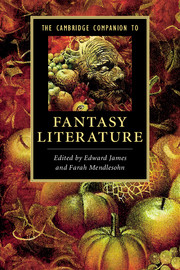Book contents
7 - Psychoanalysis
from PART II - WAYS OF READING
Published online by Cambridge University Press: 28 March 2012
Summary
There is a moment in an essay by Ursula K. Le Guin when she argues that: ‘Fantasy is the language of the inner self.’ Not least because of the multiple meanings of the word ‘fantasy’, psychoanalysis is a very useful theoretical approach in analysing fantasy: not just the mode of fictional narrative (and the narrower genre of the Fantastic) but also desires, drives or unconscious fears – which I will refer to as ‘phantasies’. Rosemary Jackson's Fantasy: The Literature of Subversion (1981) owes its subtitle in part to Sigmund Freud's and especially Jacques Lacan's notions of the divided self: fantasy ‘has a subversive function in attempting to depict a reversal of the subject's [self's] cultural formation’. Unities of space, time and character – and the attempt to represent them – are questioned both by fantasy and psychoanalysis. For Jackson, fantasy is ‘a literature of desire, which seeks that which is experienced as absence and loss’ (3) and the reader who associates fantasy just with Tolkien and his successors is likely to be disappointed by her literary choice of exemplars. At the same time, psychoanalysing genre fantasy risks tautology: since Freud draws upon myths such as that of Oedipus and stories such as Hoffmann's ‘The Sandman’ (1815) to formulate his theories, it is hardly surprising that the theories seem to work well with fantasy narratives which look back to such sources for inspiration. This chapter will outline part of the thought of three major figures in psychoanalysis – Freud, Lacan and Jung – in relation to analysing fantasy.
- Type
- Chapter
- Information
- The Cambridge Companion to Fantasy Literature , pp. 91 - 101Publisher: Cambridge University PressPrint publication year: 2012



